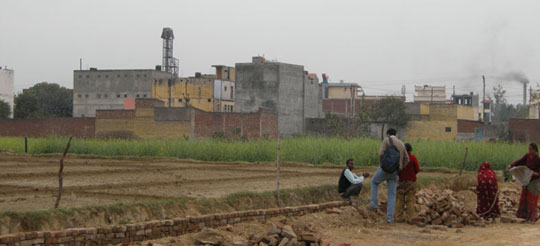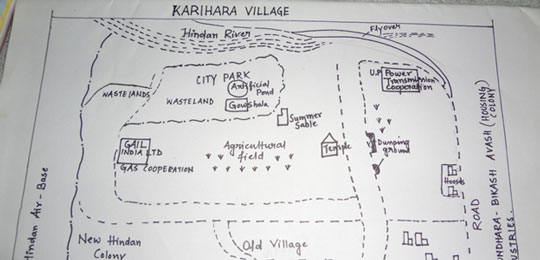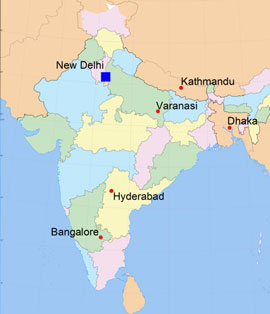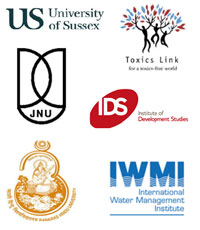This project looks at the connections between ecosystem services (ES), livelihoods and poverty in peri-urban areas of South Asia. It aims to produce evidence and tools to link ecosystem services with poverty alleviation.

Overview
Peri-urban areas, at the interface between urban and rural, link rural livelihoods with the urban lifestyles that put multiple pressures on peri-urban ecosystems. This poses huge challenges for the health and livelihoods of an increasing number of disenfranchised, poor and marginalised citizens, and for sustainable urban development.
To address these challenges, we aim to expose the hidden challenges and opportunities for sustainable urban development – by mapping and documenting flows of ES and the experiences of peri-urban communities, as well as analysing the relevant institutions, governance, policy processes and programmes.
This STEPS-affiliated project studies these questions by analysing policies and programmes, along with empirical studies with two peri-urban communities in India and five comparator sites in South Asia.
Events
Ecosystem Serrvices for Poverty Alleviation, Delhi, 6 March 2018
Publications
Digital story: What does the future hold for Delhi’s urban farmers?
Book: Karhera: A photobook
Policy Brief: Why peri-urban ecosystem services matter for urban policy – March 2017
Policy Brief: Making the most of peri-urban ecosystem services – February 2018
Article: Peri-urbanism in globalizing India: a study of pollution, health and community awareness
Waldman, L.; Bisht, R.; Saharia, R.; Kapoor, A.; Rizvi, B.; Hamid, Y.; Arora, M.; Chopra, I.; Sawansi, K.T.; Priya, R.; Marshall, F. (2017)
Recognizing sustainability frontiers in the peri-urban
Marshall, F. (2016)
Project team
 Principal Investigator: Professor Fiona Marshall, University of Sussex and STEPS Centre, UK
Principal Investigator: Professor Fiona Marshall, University of Sussex and STEPS Centre, UK- Co-Principal Investigator: Dr Priyanie Amerasinghe with Mahesh Jampani and Ambika Khada, IWMI International Water Management Institute, India & Nepal
- Co-Investigator: Professor Pranav Desai with Pritpal Randhawa and Pravin Kumar, Centre for Studies in Science Policy, Jawaharlal Nehru University, India
- Co-Investigator: Dr Ritu Priya with Ramila Bisht, Centre for Social Medicine and Community Health, Jawaharlal Nehru University, India
- Co-Investigator: Dr Jörn Scharlemann, University of Sussex, UK
- Co-Investigator: Dr Linda Waldman, Institute of Development Studies and STEPS Centre, UK
- Co-Investigator: Dr Milap Punia with Rajnish Kumar and colleagues, Centre for Studies in Regional Development, Jawaharlal Nehru University, India
- Co-Investigator: Prof Madhoolika Agrawal, Department of Botany, Banaras Hindu University, India
- Co-Investigator: Ravi Agrawal, Toxicslink, India
 This project runs for two years from 1 February 2014 and is funded by the ESPA (Ecosystem Services for Poverty Alleviation) programme.
This project runs for two years from 1 February 2014 and is funded by the ESPA (Ecosystem Services for Poverty Alleviation) programme.
Research questions
The full project title is: ‘Integrating peri-urban/urban synergies into urban development planning for enhanced ecosystem service benefits’.
Our research questions include:
How do ecosystem services (ES) relate to the livelihoods of people in peri-urban areas? What pressures are acting on ES in these areas, and what does this means for livelihoods and poverty?
What are the implications of current urban development policy initiatives for ES and poverty, and what alternative approaches emerge, which can enhance ES degradation and poverty alleviation in peri-urban situations and support wider sustainable urban development goals?
Read more about the project background and research questions
Outputs

Land cover change map
- Remotely-sensed land use/land cover change data from 1990s to 2010s for our 6 project cities
Other outputs include
- Documented knowledge of how poor people in peri-urban India use ES, the values attached to ES by diverse stakeholders and the implications and trade-offs involved for multiple dimensions of poverty
- Maps which show ES stocks, ES degradation and links to multiple dimensions of poverty
- Methods and approaches for assessing how ES interact with poverty alleviation in the context of urban development policies
- Documented knowledge about external drivers, policies and institutional arrangements which have impacts on peri-urban ecosystem services
- Documented examples and stakeholder dialogue concerning opportunities for interventions to preserve peri-urban ES, support associated poverty alleviation goals, and build peri-urban/urban synergies to meet wider sustainable urban development.
Locations
 The project has worked in detail in two sites to the south and east of Delhi: Karhera Village in Ghaziabad District, and Yamuna Pushta, a flood plain on the banks of the river Yamuna.
The project has worked in detail in two sites to the south and east of Delhi: Karhera Village in Ghaziabad District, and Yamuna Pushta, a flood plain on the banks of the river Yamuna.
Work will include parts of peri-urban areas around five additional cities (Hyderabad, Bangalore, Varanasi, Kathmandu and Dhaka). These ‘comparator sites’ will be modelled using tools developed for Delhi.
Read more about the case studies and comparator sites
Contact
Prof Fiona Marshall, Principal Investigator: [email protected]
